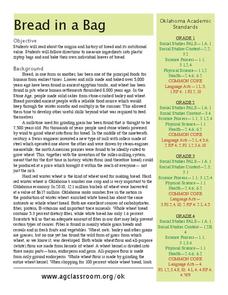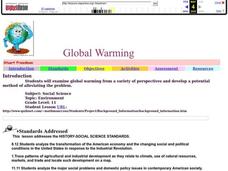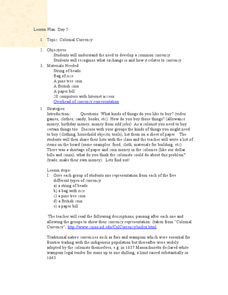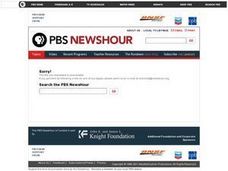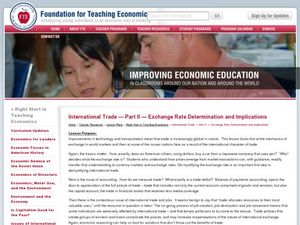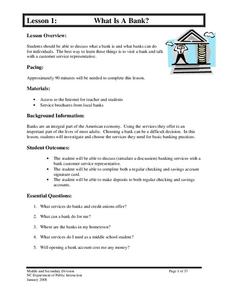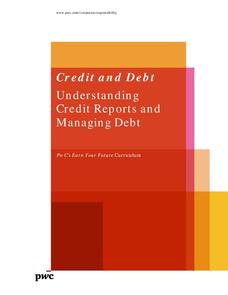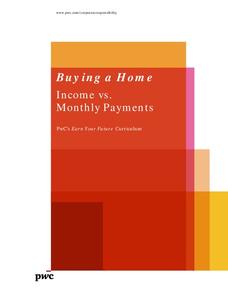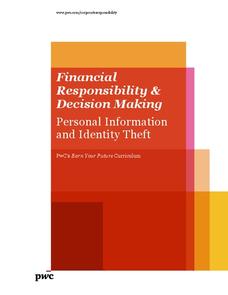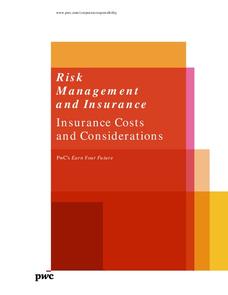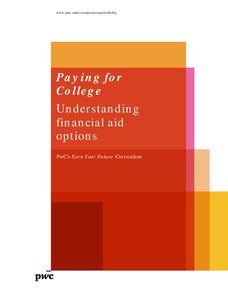Curated OER
Agriculture & Alaska's Economy
Students examine Alaska's agriculture numbers from previous years. They answer questions based on Alaska's production levels.
Curated OER
Bread in a Bag
Could the history of bread really be interesting? Yes, it could! An informational text gives scholars wheat production background from 8,000 years ago, discussing different types of bread and the current industry in Oklahoma. Learners...
Curated OER
Latin America and the Caribbean in the Classroom: The Economy and Trade
Students use the internet to gather information on daily exchange rates. They calculate the exchange rates between two countries by role playing they are going on vacation to these destinations.
Curated OER
Uncle Jed's Barbershop
Fourth graders examine productive resources. In this economics lesson, 4th graders read a book about a man who saves money to buy his own barbershop. After reading, students get into groups to play a game to learn about savings.
Curated OER
Money Matters: The Importance of Global Cooperation
Students explore the International Monetary Fund (IMF). In this global economics lesson, students prepare for a field trip to the IMF as they examine the history of the IMF and their role in global trade.
Curated OER
Global Warming
A series of independent learning activities teaches learners about global warming as it relates to economics and industrialization. The culminating project requires them to create a multimedia presentation identifying the problems,...
Curated OER
Colonial Currency
Fifth graders develop a common currency. In this colonial currency lesson, 5th graders exchange beads, rice, coins, and paper bills for goods and services. Students explore web tools to research ways colonists used money, even if it was...
Curated OER
Mini-Economy
Third graders perform jobs in order to sustain their classroom community. After completing a brief overview of how local economies are sustained, they complete job applications for classroom jobs. Students perform their jobs throughout...
PricewaterhouseCoopers
The Stock Market
Keep or sell? Young learners simulate as buyers in the stock market while learning about the benefits and important factors to know when purchasing. The thorough resource allows for observation of case studies and provides an assessment...
PBS
The Big Picture-Economic Security in the Country and your Community
High schoolers explore economic security at the local and national level during the time period preceding the 2008 presidential election. They fill out surveys on their thoughts and concerns regarding the US economy, and watch a video...
Curated OER
Market Structures and Competition
Students explore the role of government in the economy market. In this economics lesson, students analyze the decision making and how it takes into consideration additional cost, benefits and public awareness of what they are trying to...
North Carolina Department of Public Instruction
What Is A Bank?
You're never too young to learn about banking and personal finance. Use a set of seven banking lessons to teach middle schoolers about checking and savings accounts, interest rates, loans and credit cards, and safety deposit boxes.
PwC Financial Literacy
Buying a Home: Terms of a Mortgage
Buying a home, dealing with a lender, securing a mortgage; these are daunting tasks for many adults. Why not teach middle schoolers about this area of adulthood so they are better-prepared to make the leap into home ownership when they...
PricewaterhouseCoopers
Saving and Investing: Building Wealth for Financially-Secure Futures
While spending is fun, saving for a retirement is the future. Young adults learn about the importance of saving and different opportunities to do so during their adulthood.
PricewaterhouseCoopers
Credit and Debt: Understanding Credit Reports and Managing Debt
Credit cards are tempting to use right out of high school. Teach your upperclassmen the benefits and challenges of credit and how it can affect their future. The lesson covers credit scores and ways to strengthen credit if learners find...
PwC Financial Literacy
Planning and Money Management: Spending and Saving
Financial literacy is such an important, and often-overlooked, skill to teach our young people. Here is a terrific lesson which has pupils explore how to come up with a personal budget. They consider income, saving, taxes, and their...
PricewaterhouseCoopers
Paying for College: Finding the Right Fit
Most want to attend college, but do they know where? How will they afford it? How do they apply? Learners discover the costs associated with college and the best way to budget and possibly apply for financial aid.
PricewaterhouseCoopers
Buying a Home: Income vs. Monthly Payments
Purchasing a house takes more plan than elementary schoolers realize. Each buyer will look at monthly income to determine what they can afford for a mortgage and other expenses.
PwC Financial Literacy
Finanacial Responsibility and Decision Making: Personal Information and Identity Theft
Elementary schoolers look into the very real, and scary, practice of identity theft. They discover the main techniques used by people who steal other people's identity. Learners produce an identity theft tip sheet and share their tips...
PricewaterhouseCoopers
Planning and Money Management: Financial Plan
More planning goes into a budget than a high schooler thinks. Here, they learn about the expected expenses and incomes, along with outside factors such as natural disasters. Learners prepare their own budget and adjust it based on the...
PricewaterhouseCoopers
Credit and Debt: Decisions, Decisions...
Borrowing money seems like a great idea until you are in over your head. High schoolers learn the benefits and risks associated with credit and how to be a responsible borrower. More than just credit cards, they learn trustworthiness is...
PricewaterhouseCoopers
Risk Management and Insurance: Insurance Costs and Considerations
Compare the different types of insurance with high schoolers, and have them learn the benefits and costs of medical, auto, and home policies. The resource addresses what makes some insurances more costly and what teenagers can do to find...
PricewaterhouseCoopers
Buying a Home: Mortgage Decisions
High schoolers don't think they need to know about mortgages, but with college and renting soon approaching, fiscal responsibility is necessary. Pupils learn the vocabulary of a mortgage and calculate different home values to determine...
PricewaterhouseCoopers
Paying for College: Understanding Financial Aid Options
With many options to pay for college, middle schoolers learn about each possibility and that continuing their education is worth the investment. They discover the difference between a grant and a loan and that some expensive colleges may...
Other popular searches
- American Economy System
- South American Economy
- Latin American Economy
- Early American Economy
- Native American Economy
- 1950 American Economy
- American Economy Future



